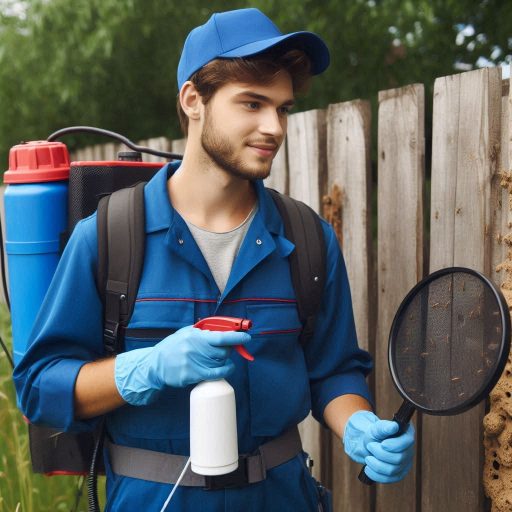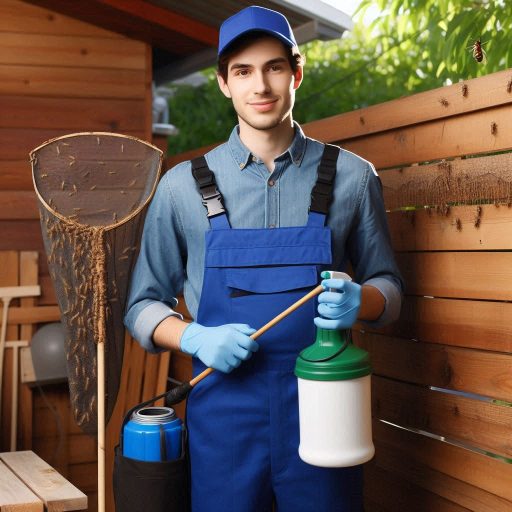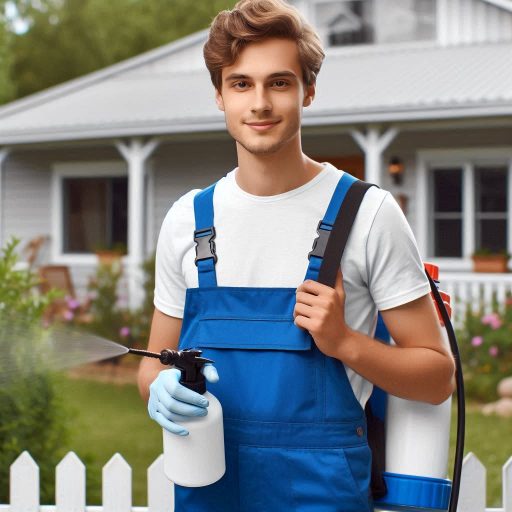Introduction
Pest control workers play a vital role in safeguarding public health by managing harmful pests that threaten homes, businesses, and agricultural settings.
These professionals prevent infestations that can lead to property damage, food contamination, and the spread of diseases.
By ensuring environments remain pest-free, pest control workers contribute significantly to maintaining cleanliness and safety in both residential and commercial spaces.
As various industries, including hospitality, food production, and agriculture, continue to grow, the demand for pest control services rises.
Increasing urbanization and climate change also contribute to the heightened need for effective pest management solutions.
This growing demand highlights the crucial nature of their work, with pest control workers in higher demand than ever before.
Despite the essential services they provide, pest control workers often face unique challenges in their roles, from safety concerns to physical demands.
At the same time, many find job satisfaction through their ability to solve problems, protect communities, and work independently.
This blog post will explore both the positive aspects of working in pest control and the challenges these workers encounter daily.
Understanding the rewards and difficulties of this field sheds light on what it takes to thrive as a pest control worker today.
Job Description of a Pest Control Worker
Responsibilities of a Pest Control Worker
A pest control worker’s primary responsibility is to inspect properties for signs of pest infestations.
They examine every part of a building, from basements to attics, searching for evidence of rodents, insects, or termites.
Once they identify a problem, they assess its severity and develop a treatment plan to eliminate the pests.
Applying treatments is another critical duty.
Pest control workers use chemicals, traps, or eco-friendly methods, depending on the infestation type and client preferences.
Each application must be precise, as errors could lead to ineffective results or health risks.
In addition, pest control workers educate clients on prevention techniques, offering advice on sanitation, sealing entry points, and regular inspections to avoid future infestations.
Physical Demands of the Job
The job of a pest control worker is physically demanding and often involves working in challenging environments.
These professionals frequently need to crawl into small spaces, climb ladders, or work on rooftops to fully inspect buildings.
Working outdoors in various weather conditions is common, whether it’s the heat of summer or the cold of winter.
They also handle equipment and chemicals that require physical strength and careful attention.
The physical demands of the job mean pest control workers must maintain good physical health to perform their duties safely and effectively.
Handling hazardous materials, working in confined spaces, and staying alert in dangerous situations require stamina and a strong safety focus.
Importance of Attention to Detail and Problem-Solving Skills in the Role
Attention to detail is crucial for pest control workers.
Identifying even the smallest signs of an infestation, such as droppings or damage, can make the difference between resolving a problem and allowing it to grow.
Overlooking minor details can lead to ineffective treatments or prolonged infestations.
Pest control workers must also be careful when applying treatments, ensuring they follow proper procedures to avoid health hazards.
Problem-solving skills are equally vital in this role.
Every infestation is different, requiring pest control workers to assess the situation and determine the most effective solution.
They need to consider factors like the type of pest, the extent of the infestation, and the client’s environment to create a tailored plan.
These professionals must adapt quickly and think critically to find the best methods for pest removal, balancing effectiveness with safety.
Read: Finding the Right Work-Life Balance as a Nail Tech
Job Satisfaction for Pest Control Workers
Sense of Accomplishment and Satisfaction from Effectively Eradicating Pests
Pest control workers often experience a strong sense of accomplishment by solving real problems for their clients.
Successfully eliminating pests from homes, businesses, and agricultural sites offers immediate, tangible results.
Every completed job means the protection of health, property, and peace of mind, giving workers a clear sense of purpose.
Clients are often grateful for their help, reinforcing the positive impact workers have on people’s lives.
This daily interaction with customers, paired with the visible results of their efforts, brings a deep sense of satisfaction and fulfillment to their work.
Opportunity for Continuous Learning and Professional Development
The pest control industry is constantly evolving, offering ample opportunities for continuous learning and professional development.
New pest management techniques, eco-friendly products, and updated safety regulations regularly enter the market.
Workers dedicated to staying current with these advancements can improve their service quality and remain competitive.
Learning about innovations such as safe pesticide handling practices, integrated pest management, and emerging pest prevention methods helps pest control professionals stay at the forefront of the field.
This continuous professional growth is key to keeping the work engaging and ensures that employees are always developing their skills.
Potential for Job Stability and Advancement Opportunities
The pest control industry offers considerable job stability, a crucial factor in long-term job satisfaction.
Pest problems persist across urban, rural, and agricultural settings, keeping the demand for skilled pest control workers steady.
Regardless of economic fluctuations, pest control remains an essential service that people cannot neglect, ensuring consistent job opportunities.
Pest control workers also benefit from advancement possibilities.
Starting as technicians, they can progress to supervisory roles, manage teams, or even start their own pest control businesses.
Many companies provide training and certification programs, which help workers sharpen their skills and expand their career prospects.
With dedication and the right opportunities, pest control workers can achieve long-term success and growth within the industry.
Job satisfaction for pest control workers is rooted in the sense of accomplishment they gain from helping clients, the opportunities for continuous learning and professional development, and the stability and career advancement potential the industry offers.
Pest control is a rewarding career path for individuals who enjoy problem-solving, staying up-to-date on industry trends, and making a lasting, positive impact on the communities they serve.
Read: Steps to Become a Professional Pet Groomer in the USA
Challenges Faced by Pest Control Workers
Physical Risks and Hazards Associated with Handling Potentially Dangerous Chemicals and Equipment
Pest control workers face significant physical risks in their line of work.
One of the main hazards comes from handling potentially dangerous chemicals such as pesticides and insecticides.
Even with protective gear, exposure to these substances can cause respiratory problems, skin irritations, or worse if safety protocols are not followed carefully.
Additionally, pest control workers often operate heavy or specialized equipment, increasing the risk of injury.
Workers may find themselves climbing ladders, crawling through confined spaces, or navigating hazardous environments, putting them at risk of slips, falls, or other accidents.
Proper training and safety precautions are essential, but the physical demands and risks remain a daily challenge for pest control professionals.
Emotional Toll of Dealing with Unpleasant Situations and Difficult Clients
Beyond the physical challenges, the emotional toll of pest control work can be significant.
Pest control workers frequently encounter distressing or uncomfortable environments.
These can include severe infestations in unsanitary or cluttered spaces, where dealing with large numbers of pests like rodents, insects, or even snakes can be mentally exhausting.
Additionally, the job often involves interacting with clients who may be anxious, upset, or embarrassed about their pest issues.
Some clients may be difficult to deal with, either expressing frustration over the infestation or being dissatisfied with the speed or effectiveness of the treatment.
Maintaining professionalism and staying calm in these tense situations is critical, but it can lead to stress and burnout over time.
Need to Constantly Stay Updated on New Pest Control Techniques and Regulations
In the pest control industry, staying updated on new techniques, products, and regulations is not optional — it’s necessary.
Pests evolve, and so do the methods needed to control them effectively.
Pest control workers must continuously learn about advancements in treatment options, such as more effective or eco-friendly pesticides.
Moreover, regulatory changes regarding the use of chemicals and safety protocols can have a direct impact on daily operations.
Governments are increasingly enacting regulations to protect both the environment and public health, and pest control workers need to comply with these new rules.
Failing to stay informed can result in using outdated or harmful methods, which could put workers, clients, and the environment at risk.
Therefore, ongoing education and certification renewal are crucial aspects of the profession, adding another layer of challenge to an already demanding job.
In review, pest control workers deal with a unique set of challenges that include physical hazards, emotional strain, and the need for continual education.
Their ability to manage these difficulties is essential for providing effective pest control services while safeguarding their own well-being.
Read: Essential Skills Every Pet Groomer Should Have

Work-Life Balance for Pest Control Workers
Explanation of the Irregular and Long Hours
Pest control workers often face irregular and long hours, particularly during peak seasons.
Spring and summer, when pests are most active, are usually the busiest times of the year.
This period requires workers to handle more service requests and emergency calls, often extending beyond traditional work hours.
Additionally, the nature of pest control, which sometimes involves dealing with infestations or urgent situations, makes it difficult to predict when a day will end.
These factors contribute to a demanding schedule that can disrupt work-life balance.
Impact on Personal Relationships and Overall Well-Being
The irregular hours and intense demands of pest control work can significantly affect personal relationships.
Missing important family events or regularly working late hours may lead to tension at home.
Friends and family members may not fully understand the unpredictable nature of the job, further straining relationships.
Over time, the stress from long hours combined with physically demanding tasks can take a toll on both mental and physical well-being.
This impact can manifest as fatigue, burnout, or frustration, making it essential to address the challenges of maintaining a healthy work-life balance.
Strategies for Maintaining a Healthy Work-Life Balance
Maintaining a balance between work and personal life is crucial for pest control workers to thrive in their careers and personal lives.
One effective strategy is establishing boundaries.
Workers should communicate their availability to employers and clients, ensuring they have dedicated time off for personal needs.
Scheduling breaks or setting specific hours for non-emergency tasks can help create a buffer between work and home life.
Another approach is to practice time management skills.
By organizing their daily tasks and prioritizing urgent jobs, pest control workers can better manage their workload and avoid overextending themselves.
Incorporating self-care into daily routines is another vital strategy.
Pest control workers often deal with physically strenuous and potentially hazardous tasks, so prioritizing rest and recovery is essential.
Regular exercise, sufficient sleep, and healthy eating habits can boost energy levels and help manage stress.
Moreover, engaging in hobbies or activities outside work can help workers decompress and recharge.
These activities can provide a mental escape from the demands of the job, making it easier to maintain a healthy mindset.
Additionally, fostering supportive relationships is key to managing work-life balance.
Connecting with peers in the industry can create a sense of community and provide a space to share challenges and solutions.
Workers should also communicate openly with family and friends about their work demands, ensuring they understand the unpredictable nature of the job.
By fostering understanding and support, pest control workers can alleviate the emotional strain that long hours might bring.
Ultimately, maintaining a healthy work-life balance in the pest control field requires proactive steps.
With the right strategies, workers can find harmony between their professional and personal lives.
Read: How to Handle Emergency Situations in Pet Grooming
Support and Resources Available for Pest Control Workers
Pest control workers face unique challenges in their line of work, from handling hazardous chemicals to managing stressful situations.
However, a variety of support systems and resources are available to help these professionals thrive in their roles.
Access to proper training programs, industry organizations, and mental health support plays a crucial role in ensuring their success and well-being.
Overview of Training Programs and Certifications
One of the most important resources for pest control workers is the availability of comprehensive training programs.
These programs equip workers with the necessary knowledge to handle pests safely and effectively.
Certifications such as those offered by the National Pest Management Association (NPMA) can enhance a worker’s skill set, ensuring they meet industry standards.
Programs often cover topics such as safe chemical use, pest identification, and environmental regulations, all vital for professional growth.
Many employers encourage workers to pursue these certifications, as they demonstrate a commitment to quality and safety.
Workers who participate in these training programs often find themselves better equipped to handle complex pest issues and respond confidently to customer concerns.
Industry Organizations and Support Networks
Pest control workers can also benefit greatly from joining industry organizations and support networks.
The NPMA is one such organization that offers valuable resources, including access to industry news, best practices, and regulatory updates.
Additionally, these organizations often provide networking opportunities, allowing workers to connect with peers and share experiences.
Industry forums and events can foster a sense of community, reducing the isolation that pest control workers sometimes feel in their roles.
Membership in these organizations not only provides practical resources but also offers a platform for professional development and career advancement.
By staying connected with peers and industry experts, pest control workers can stay informed about the latest trends and innovations in the field.
Transform Your Career Today
Unlock a personalized career strategy that drives real results. Get tailored advice and a roadmap designed just for you.
Start NowMental Health Support for Job-Related Challenges
Working in pest control can take a toll on mental health.
The physical demands, potential exposure to dangerous substances, and unpredictable work hours can lead to stress and burnout.
It is essential for pest control workers to have access to mental health resources that help them manage these challenges.
Many industry organizations now offer mental health support through employee assistance programs (EAPs), providing access to counseling services and stress management tools.
Additionally, promoting a culture of open communication about mental health can reduce the stigma surrounding these issues, making it easier for workers to seek help.
Employers who invest in mental health support create a more positive work environment, which ultimately leads to better job satisfaction and employee retention.
Training programs, industry organizations, and mental health resources are critical in supporting pest control workers.
By taking advantage of these resources, professionals in this field can improve their skills, stay connected, and maintain their overall well-being.
Conclusion
Pest control workers play a vital role in maintaining public health and safety.
Throughout this blog, we explored the key aspects of their profession, including job satisfaction and challenges.
Many pest control workers find satisfaction in the tangible results of their efforts, knowing they help protect homes and businesses.
However, the job also presents challenges, such as exposure to hazardous materials, physical strain, and unpredictable work hours.
Balancing these demands with personal life can be difficult, though some companies offer support resources to improve work-life balance.
It’s important for anyone considering a career in pest control to weigh both the rewards and challenges.
The job can be physically demanding, but it offers the satisfaction of making a positive difference.
Training and ongoing education are crucial for ensuring safety and effectiveness in the field.
Support networks, whether through employers or industry organizations, can help manage the pressures of the job.
Ultimately, pest control workers are essential to public health by preventing the spread of diseases and safeguarding our environments.
For those considering this career, it’s important to reflect on the challenges and rewards before making a commitment.
With the right mindset and preparation, pest control can be a fulfilling and impactful career.




